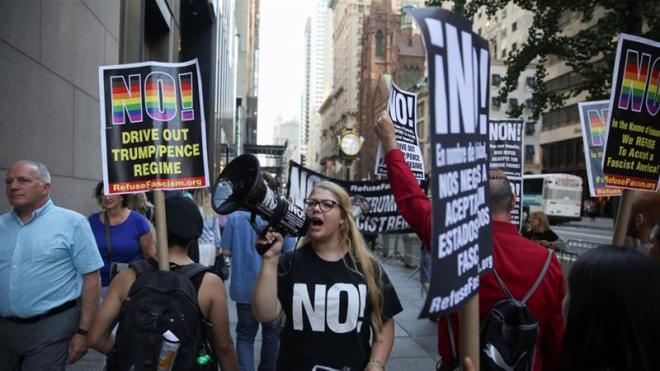
Tuesday June 27, 2017

The US Supreme Court partially reinstates temporary travel restrictions on refugees and six Muslim-majority countries.
Washington, DC - Refugee advocacy groups have raised concerns after the US Supreme Court partially reinstated the Trump administration's ban on travellers from six predominantly Muslim countries - commonly known as the "Muslim ban" - and all refugees, until it reviews the ban in October.
"I am deeply disappointed by the court’s decision … the suspension of refugee resettlement will impact the most vulnerable of the world's populations," Eric Schwartz, president of Refugees International, said in a statement sent to Al Jazeera.
US President Donald Trump claims the order, originally signed in March after a similar ban was struck down in February, is necessary for the US to revamp its screening protocols for refugees. He said the decision was a "clear victory" for national security in a statement on Monday.
Schwartz disagreed: "There is no reasonable national security justification for these measures." According to reports, no refugees have been responsible for fatal attacks in the US since the Refugee Act of 1980 set up systematic procedures for accepting refugees into the country.
The ban takes effect 72 hours after the injunction was lifted - Thursday morning in the US. It places a 90-day freeze on visas to travellers from Syria, Iran, Somalia, Sudan, Libya, and Yemen - as well as a 120-day freeze on the nation's refugee programme.
The court made an important exception, saying the ban "may not be enforced against foreign nationals who have a credible claim of a bona fide relationship with a person or entity in the United States".
Proving 'bon fides'
The exception granted to those with "bona fide" relationships means that refugees and travellers should have familial, work or education connections to the US, such as a spouse, job offer or acceptance to a domestic university.
Betsy Fisher, lawyer and policy director for the International Refugee Assistance Project (IRAP), a party named in one of the cases against the ban, told Al Jazeera that the extent to which the reinstatement will affect refugees remains to be seen.
"I think a lot of it will depend on how the phrase 'bona fide relationship to the US' will be determined," Fisher said. The relationship exception was made because the challenges to the ban came from individuals and organisations whose families and employees would be affected.
Asylum seekers from Iraq often have familial relationships or a work history with the US military, said Fisher. According to the US Census, there are over 215,000 people of Iraqi ancestry living in the country as of 2015. Thousands received visas through the Special Immigrant Visa programme, created specifically for Iraqis that assisted the US since it invaded the country in 2003.
This means Iraqi refugees could more easily prove their bona fides compared to Syrians or Sudanese. Individuals from these nations have smaller US populations - 82,681 and 46,037, respectively - and no similar visa programmes, Fisher observed.
The burden of bona fide tests could "prove unworkable", according to the partial dissenting opinion from Supreme Court Justice Clarence Thomas. Consular officials must now decide, "on peril of contempt" whether people from the banned nations have a sufficient connection to persons or entities in the US, and face a "flood of litigation" from those denied, stated Thomas.
Akila Radhakrishnan, vice-president and legal director of the Global Justice Center (GJC), a New York-based group that works for gender equality and protection of vulnerable groups, told Al Jazeera in an interview the ban's reinstatement was a "serious issue" for endangered minorities in all six of the nations included on the ban, due to their limited connections to the US.
Religious minorities like the Yazidis, the majority of whom live in Iraq but are also found in Syria and Iran, are an example. The sect is insular, keeping marriages and other relationships within their own communities. Estimates place their US population in the low thousands and they are predominately found in one city in Nebraska.
Rather than coming through a temporary non-immigrant visa - as Iraqis are entitled after having their nation removed from the original ban - these and other vulnerable populations would likely travel to the US as asylum seekers.
"By limiting it to bona fide … you're limiting the scope of the protections" given to refugees by international law, Radhakrishnan said. Even those from larger groups in Iraq and other nations aren't guaranteed to meet the “bona fide” standard, she explained.
Radhakrishnan argues that the ban's reinstatement also costs the US status in the international community, as it is a "policy based on racism and xenophobia".
In spite of the court's decision, groups like IRAP and the American Civil Liberties Union (ACLU), which said it was confident the ban will be struck down "once and for all" come October, vowed to continue advocating for those in need.
But they voiced concern the administration would interpret the ban as broadly as it could.
"It's going to be very important for us over this intervening period to make sure the government abides by the terms of the order and does not try to use it as a back door into implementing the full-scale Muslim ban that it's been seeking to implement," said Omar Jadwat, an ACLU lawyer, reported Reuters.
IRAP's Fisher said "a lot remains to be seen," but they "look forward to the decision in October."